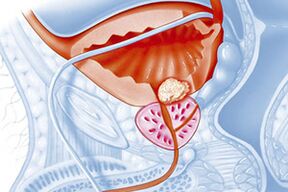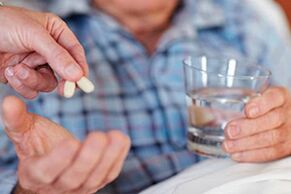Chronic prostatitis is an inflammatory disease of the prostate gland, characterized by organic tissue changes and dysfunction of the prostate gland, male reproductive system, and urinary tract.

The prostate is a tubular alveolar gland found only in men. This gland is involved in sperm production and is located below the bladder, around the first part of the urethra. Chronic prostatitis in men can occur as a result of an infection of the prostate gland from the bladder through the blood and lymphatic vessels of the pelvis or in another way. While the presence of an infection may not cause illness or impotence, it usually does not go away for a man without a trace. Currently, the man is observing decreased penile hardness, sexual dysfunction during sex, and urinary disturbance.
Chronic prostatitis is not life-threatening in men, but it can still cause psychological distress and impair family relationships. It should also be noted that, according to experts, chronic prostatitis, namely, not timely treatment, can lead not only to the development of serious complications, but also to prostate cancer. paralysis. Indeed, in addition to infection, there are several other factors that lead to chronic prostatitis. However, the presentation and exacerbation of chronic prostatitis have different specific characteristics.
Stages of chronic prostatitis
Although there is still no specific feature for the development of chronic prostatitis, experts distinguish the following types of diseases:
- I have acute bacterial prostatitis;
- II bacterial prostatitis. It is most commonly found;
- Chronic nonbacterial prostatitis III is a symptom complex of chronic pelvic pain, lasting more than 3 months;
- type III A is an inflammatory form of chronic prostatitis with an increase in the level of leukocytes in the secretion of the prostate gland;
- III B is a non-inflammatory form of chronic prostatitis without an increase in the level of leukocytes and pathogens in the secretion of the prostate gland;
- Type IV is diagnosed as asymptomatic, painless chronic prostatitis and is discovered quite incidentally based on the results of analysis of the secretions of the prostate gland or its biopsy.
The frequency and causes of this type of chronic prostatitis are unknown. As for the reasons for the development of other types of diseases, it should be noted here that they can be due to the penetration of various infectious microorganisms into the ureters, as well as a violation of various functions in the bodyman.
Methods to prevent prostatitis
Chronic prostatitis requires long-term treatment. So you'd better follow precautions to avoid it. To do this, the patient only needs to make some lifestyle adjustments, which will not only benefit their general health condition but also help the disease go into remission. So, first of all, the following precautionary rules must be observed:
- strive for a healthy lifestyle;
- completely exclude spicy foods from the diet;
- not abuse alcohol;
- playing sports, including exercises that strengthen the muscles and improve blood circulation in the pelvic organs;
- join yoga classes of your choice;
- compliance with methods of prevention and treatment of infectious diseases;
- eliminate pelvic congestion and timely treat anorectal diseases;
- exclude excessive masturbation;
- try to have a regular, but at the same time, safe sex life;
- avoid hypothermia;
- do not sit on cold surfaces;
- During sedentary work, warm up more often.
In addition to these precautions, men should be aware that the manifestation of chronic prostatitis is insignificant. So, if a man observes discharge when urinating or defecating, and also feels slight pain, then in this case, immediate medical attention is needed. It should also be remembered that the course of treatment should be carried out strictly under the supervision of a specialist without any neglect. In addition, the selection of drugs during antibiotic therapy is made according to the individual condition of the patient and only after he has undergone special studies. Do not interrupt taking the medicine as prescribed, moreover, do not take more medicine without a doctor's prescription. Don't delay your doctor's appointment. By searching our website, you can easily find a clinic that suits both location and pricing policy.
Causes of prostatitis
Chronic prostatitis in medicine is positioned as a multifactorial disease. In addition to the penetration of infection into the ureteral organs, it can occur and recur due to the presence of neurological and hemodynamic disorders, as well as the weakening of the immune system and autoimmune processes. immunological, hormonal or biochemical. Prostatitis can develop against the background of such diseases as:
- Depression;
- neurogenic bladder dysfunction;
- sympathetic reflex dystrophy;
- inflammatory processes of adjacent organs are located;
- bladder neck hypertrophy;
- prostate tumor;
- tightening the urethra;
- rectal diseases.
Given these factors, the following are thought to increase the risk of developing prostatitis:
- sedentary lifestyle, especially sitting a lot will disturb the blood supply to the pelvic organs;
- local hypothermia of the body;
- frequent constipation;
- irregular sex or sudden exertion;
- chronic infections;
- previous sexually transmitted diseases. In particular, their delayed treatment;
- improper nutrition;
- Sleepless;
- chronic stress.
In addition, chronic nonbacterial prostatitis can be caused by the formation of body trigger points during disease, trauma, and surgical intervention on the pelvic organs.
Symptoms of Chronic Prostatitis

The symptoms of chronic prostatitis don't bother a man much. Prostatitis comes on suddenly. The patient may be disturbed by acute pain in the perineum and inguinal region, may also experience pain during urination and defecation, accompanied by discharge from the urethra. All of these signs of chronic prostatitis can be accompanied by fever, fever, and fever. Usually, these symptoms are intermittent. In addition, chronic prostatitis can be manifested as a complication of sexually transmitted diseases. During the course of the disease, the patient may experience discomfort when urinating, pain in the perineum as well as discharge. Chronic inflammation of the prostate gland leads to erectile dysfunction and delayed ejaculation.
The inflammatory process of the prostate gland travels deep into the urinary system, which can lead to cystitis and pyelonephritis. Often, these exacerbations end with inflammation of the testicles and appendages, leading to infertility, requiring long-term treatment. Therefore, you should not delay going to the doctor. Prompt diagnosis and treatment is required. It is important to remember that chronic prostatitis can be cured if the disease does not start.
Diagnosis of chronic prostatitis
As a rule, the doctor can diagnose this type of chronic prostatitis or this type of chronic prostatitis based on the complaints indicated by the patient or after an examination. The specialist first palpates the prostate gland, then asks the patient to do a urine culture and prostate secretion test. This diagnosis allows you to determine the next course of treatment of chronic prostatitis. In addition, the urologist may apply diagnostic methods such as:
- transrectal ultrasound, which allows you to determine the size and volume of the prostate gland, as well as determine the presence of a tumor;
- determining urethral pressure helps find the cause of urinary disorders and pelvic floor muscle function;
- microscopic examination to scrape the mucous membrane of the urethra, which helps to determine the presence of a specific plant that causes infectious diseases; X-ray of the prostate gland;
- MRI scans of the pelvic organs, which help differentiate from prostate cancer, as well as identify non-inflammatory bacterial prostatitis;
- Determination of humoral and cellular immunity in prostate secretions. This type of study not only helps to diagnose the type of inflammatory process of the prostate gland, but also solves the question of what methods can be used to cure chronic prostatitis.
Treatment of chronic prostatitis
Chronic prostatitis is considered an insidious and complex disease, its treatment requires an integrated approach. Urologists use treatments such as:
- Antibiotic therapy, in which drugs are prescribed to destroy the lurking microorganisms of the infection. Patients take these drugs for several weeks. In the absence of a suitable effect, the antibiotic can be replaced by another group of drugs;
- physical therapy may include exposure to electromagnetic waves, ultrasound waves and lasers, which significantly increases the effectiveness of antibiotic therapy;
- magnetic laser therapy has an anti-congestive effect and improves blood microcirculation in the pelvic organs;
- Prostate massage through the rectum is the most painful and uncomfortable treatment, but at the same time the most effective. It is based on the removal of inflammatory secretions by squeezing it out with the fingers;
- darsonvalization;
- drug electrophoresis;
- hormone therapy;
- transurethral electrosurgery. This method of treatment can only be used in cases where complications, in addition to violations of the urinary process or reproductive function in men, lead to the onset of sclerosis of the prostate and bladder neck. . If after surgery an exacerbation of a chronic inflammatory process is observed, then in this case the patient can have all remaining glands removed;
- Immunomodulatory aims are not only to eliminate the infection, but also to completely eliminate its re-occurrence. This method of treatment implies the normalization of lifestyle, which includes an active lifestyle, regular walking, adherence to a daily regimen and proper nutrition;
- Spa treatment.
In addition, the indicated treatment for chronic prostatitis may include a visit to an immunologist and additional special tests. Since stopping this or that course does not guarantee complete eradication of the prostatitis infection, there is a chance that it will flare up again. In order to cure chronic prostatitis, the patient needs to strictly follow all the instructions of the doctor and follow the correct course of treatment to the end.




































